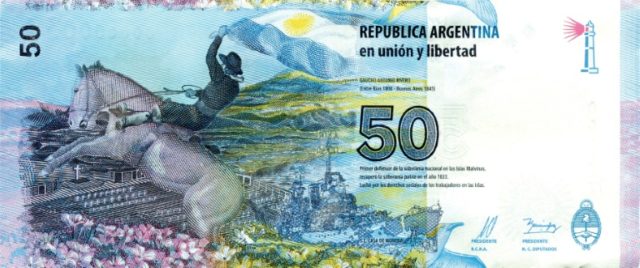Buenos Aires (AFP) – Argentina’s Central Bank on Friday hiked its benchmark interest rate to 40 percent to support the peso, the third such hike in just over a week and one day after the currency plunged in value.
Following the decision, the peso — which has lost more than 10 percent of its value in the past month — opened 6.0 percent higher against the dollar.
Although it has since given up some of those gains, analysts said the move suggested the Central Bank had done enough for now to stabilize the peso.
The government also said it was lowering its primary fiscal deficit target for 2018 from 3.2 percent (of GDP) to 2.7 percent, Treasury Minister Nicolas Dujovne said.
The bank had raised its key rate to 33.25 percent on Thursday, but that failed to prevent the peso tumbling 7.64 percent on one of the most tense days for the government of President Mauricio Macri.
It was the third such hike in just over a week. The first hike was on April 27, when the Central Bank raised the rate to 30.25 percent to ease pressure on the national currency.
Like other emerging market currencies, the peso has been buffeted by a rise in US government bond yields encouraging investors to buy US treasury bonds.
Friday’s interest rate hike, “the third emergency hike in a week, finally seems to have brought some support to the currency,” Capital Economics research group said, suggesting that the bank had “probably done enough for now to stem the tide.”
– 6.7 pct rise in living costs –
A traumatic history of hyperinflation, financial crises and bank runs in Latin America’s third-largest economy has prompted Argentines to try to buy dollars to protect their savings when financial troubles arise, complicating the Central Bank’s efforts to prop up the peso.
Inflation remains a problem. In the first three months of the year, the cost of living rose 6.7 percent, according to Indec, the official statistics agency.
Dujovne acknowledged that high interest rates could impact on growth.
“We hope that this hike in the base rate will be as short as possible,” he said Friday.
But Capital Economics said it was likely that interest rates would need to stay at emergency levels “for a prolonged period.”
“In Argentina, we expect rates will need to remain higher for longer to tackle the entrenched inflation problem. And if the central bank loosens policy prematurely, it could risk triggering a re-run of the current crisis.”
– Inflation target unchanged –
Argentina’s economy grew 2.8 percent in 2017, and the government is aiming for 3.5 percent this year.
The Central Bank also ratified an inflation target of 15 percent for 2018, although the IMF has projected it will reach 19 percent and private consulting firms see it reaching 20 percent.
“The inflation target is not going to change,” Dujovne said, outlining a longer-term outlook of 10 percent in 2019, and 5.0 percent in 2020.
But analysts believe the dollar’s climb against the peso will put pressure on prices, thereby complicating efforts to meet the government’s inflation targets.
“Every time, the government is moving away from the inflation target. And putting the rates up is going to put a dent in economic activity which is not going well but will get worse with these concerns which are incorrectly labeled as volatility,” economist Gabriel Rubinstein told TN television on Thursday.

COMMENTS
Please let us know if you're having issues with commenting.